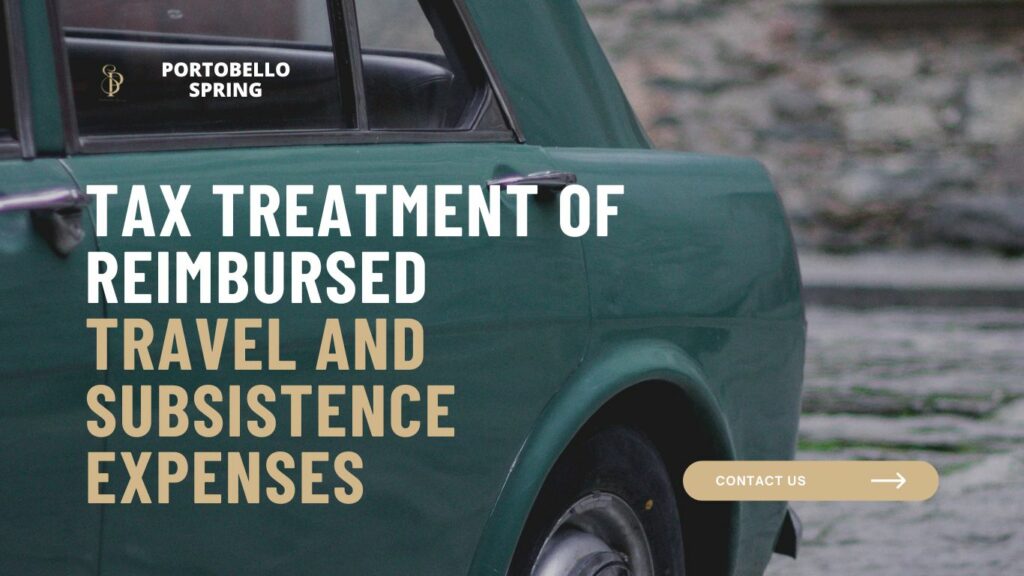Navigating Tax-Free Reimbursements; Learn how employees can navigate tax-free reimbursements. Read our comprehensive guide now!
For tax compliance, understanding the tax treatment of reimbursed travel and subsistence expenses is crucial for both employers and employees. Properly managing these expenses can ensure compliance with tax regulations and prevent unnecessary tax liabilities. In this detailed blog, we will be focusing on the conditions under which such reimbursements can be made tax-free.
Navigating Tax-Free Reimbursements

General Principles for Tax-Free Reimbursements
1. Reimbursement Conditions
The reimbursement of travel and subsistence expenses can be made tax-free under specific conditions:
- Temporary Absence from Normal Work Location: The employee or office holder must be temporarily away from their normal place of work while performing their duties.
- Necessity of Travel Expenses: The travel expenses must be necessary for performing the duties of the office or employment.
- Subsistence Expenses: Subsistence expenses must be directly related to the travel necessary for performing the duties.
2. Determining the Normal Place of Work
The normal place of work is where an individual typically performs their duties. This may differ from the employer’s base. Eg, if a business has multiple locations, an employee’s normal place of work could be different from the business’s headquarters. Importantly, an individual’s home is generally not considered their normal place of work unless there is a specific requirement to work from home.
3. Business Journeys
A business journey involves traveling between different work locations and is usually associated with a temporary absence from the employee’s normal place of work. However, traveling between home and work is not considered a business journey and is taxable.
4. Travel Between Separate Employments
Travel between separate employments is also considered commuting rather than business travel. Consequently, such travel expenses are taxable. For instance, if an employee has multiple jobs, the travel between these jobs is not eligible for tax-free reimbursement.
Navigating Tax-Free Reimbursements
5. Working at Multiple Locations
Employees who work at various locations daily within the same employment can have their travel expenses reimbursed tax-free. However, commuting from home to the first work location and from the last location back home remains taxable.
6. Special Cases
Home-Based Business Journeys: When an employee begins a business journey from home or ends it at home, the tax-free reimbursement is limited to the lesser of the expenses incurred from home to the temporary work location or from the normal place of work to the temporary location.
Travel to Foreign Assignments: Travel from home in Ireland to a temporary work location abroad is treated as a business journey and qualifies for tax-free reimbursement.
Reimbursement Rates and Methods
1. Remote Working: For employees working partially from home and partially from the office, travel and subsistence expenses between home and the office are not eligible for tax-free reimbursement.
2. Flat Rate Allowances: Employers can reimburse travel and subsistence expenses up to the prevailing Civil Service rates without specific Revenue approval. For other rates or schedules, Revenue approval is required.
3. Vouched Expenses: When employees bear the cost of travel and subsistence, and provide vouchers or receipts, these expenses can be reimbursed tax-free by the employer. Note that any reimbursement, including flat rate allowances, is considered pay and will be taxed if the employee claims additional tax relief.
Record-Keeping and Reporting
Employers must maintain detailed records of reimbursed expenses, including the employee’s name, travel dates, reasons, and costs. The retention period for such records is six years post-tax year.
Enhanced Reporting Requirements (ERR): As per Section 897C of the Taxes Consolidation Act 1997, employers must report certain reimbursed expenses to Revenue, starting from January 1, 2024. This includes tax-free reimbursements of travel and subsistence expenses.
Navigating the tax treatment of reimbursed travel and subsistence expenses requires careful consideration of various factors and adherence to established principles. By understanding these guidelines, employers can manage reimbursements effectively, ensuring compliance with tax regulations while supporting their employees.
For more information or personalised advice on travel and subsistence expense reimbursements, consult with our taxation compliance expert.
Disclaimer:
The information in this blog post is intended for general informational purposes only and should not be construed as professional advice. It is your responsibility to seek professional advice tailored to your specific situation.
Let us help you make the right moves for your business by contacting and joining us
Join our newsletter now and get insights on the latest developments going on in the accounting, tax, incorporation, immigration and company secretarial world. Or, contact us by writing in your query in the contact form

Leave a Reply